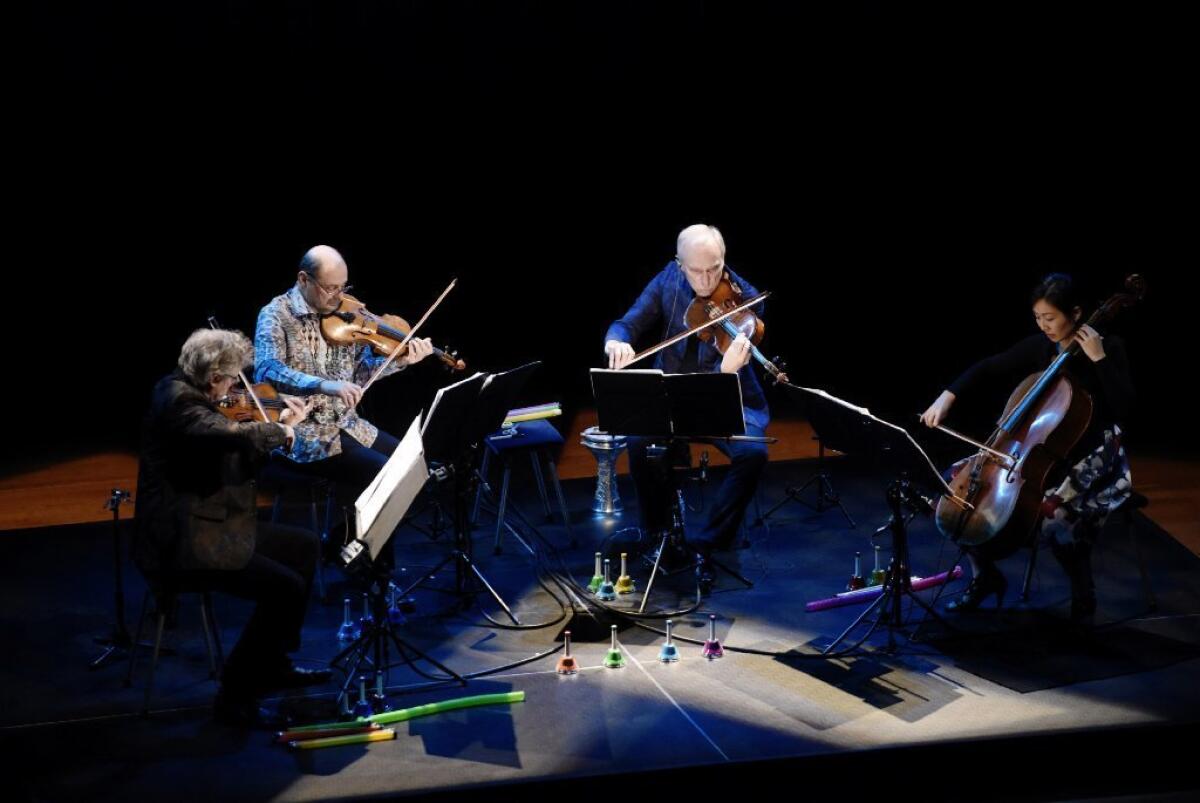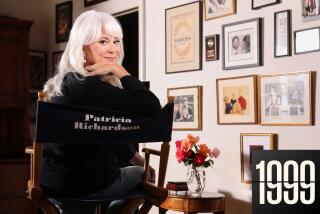Review: The quiet protest, amid bombs bursting, of Kronos Quartet

The symbolic meaning of the string quartet, the most perfect ensemble, is that of harmony raised high. Four string players, like of instrument family and mind, performing daily for years and often decades, were initially meant to voice the essence of four-part harmony along with displaying the delights of musical interaction.
That Age of Reason ideal expanded throughout the 19th and 20th centuries, but with the string quartet still a reasonable vehicle for great composers’ inner musical thoughts and feelings. Then along came Kronos. In the last quarter of the 20th century, the Bay Area outfit revolutionized everything in string quartet country and beyond.
On Saturday night, along came Kronos to Chapman University’s new Musco Center for the Arts. With the exception of a young cellist, the quartet — which has retained the same, now aging, membership for more than four decades — remains as geographically, politically and spiritually feisty as ever. Forget about genre; Kronos made that an irrelevant term ages ago.
The place to begin is probably politics. The string quartet serves better than just about anything I can think of as a salvation from all that is going on right now from which you may desperately crave respite. But in the 20th century, the quartet did begin to take on worldly concerns. Schoenberg’s “Ode to Napoleon” for reciter and string quartet might have been written for the era of Trump protest. The Kronos was founded in the early 1970s specifically to play George Crumb’s “Black Angels,” a string quartet in protest of the Vietnam War.
Kronos has never stopped taking a stand, nor has it ever stopped cajoling composers from unexpected walks of musical life to collaborate with a string quartet. These can be a classic European avant-gardist, an American Minimalist, an Inuit throat singer, a Bollywood composer, a Chinese pipa virtuoso, an African or South American folk musician, a Syrian or Afghan pop star.
A selection of some of the above — the Kronos can now choose from nearly 1,000 works it has premiered, with new ones coming in pretty much every few days — found its way to Musco.
For the most part, the program was without theme, other than revealing the range of what is now possible with the contemporary string quartet. Amplified from the start (another once-controversial Kronos novelty), the ensemble has always thrived, like rockers and avant-gardists of old, on making unconventional sounds. Here in arrangements of Congolese band Konono No. 1’s gritty “Kule Kule,” Chicago blues singer Willie Dixon’s soulfully raspy “Spoonful” and Syrian pop singer Omar Souleyman’s gloriously scratchy and gloriously titled love song “La Sidounak Sayyada” (I’ll Prevent the Hunters From Hunting You), Kronos appeared neither to channel nor appropriate foreign cultures so much as just do what enthusiastic musicians the world over love to do: simply play along.
The two newest pieces came from Fifty for the Future, a multi-year Kronos education project of commissioning 50 works from composers famous (such as Philip Glass and Laurie Anderson), emerging and outsider that young ensembles can play. Scores and recordings are being distributed free on Kronos’ website (10 are now ready). The two on this program, co-commissioned by the Philharmonic Society of Orange County (which presented the concert), were Nicole Lizée’s “Another Living Soul” and Tanya Tagaq’s “Sivunittinni” (The Future Ones). Both composers are from Canada.
Lizée’s was a world of cinematically inspired weirdness that involved, along with semi-standard string quartet playing, the whirling of whistling tubes and players bowing their instruments with a floppy something called a gravity tube bow and ringing desk bells operated by foot petals. Tagaq needed nothing other than the traditional instruments to imaginatively evoke the even weirder sound world of Inuit women blowing into one other’s mouths, tickling their throats into uncontrollable laughter.
How well does an age-old Kronos play these days? No problem there. A suite arranged by David Lang of Clint Mansell’s score for “Requiem for a Dream” and the last movement of Terry Riley’s epic string quartet “Salome Dances for Peace” offered moments of well-tuned reflection.
The inspiration for Mary Kouyoumdjian’s haunting arrangement of “Groung” (Crane), a song by Armenian composer Komitas, was a 1916 recording sung by Zabelle Panosian that first violinist and Kronos founder David Harrington told the audience possessed him once he heard it on YouTube. The first few notes of Harrington’s unforgettable rendition sounded as though they were disembodied from the instrument.
Kouyoumdjian’s own “Bomb of Beirut” was the most overtly political piece on the program. In the 22-minute quartet, she evoked the sonic landscape of the 15-year Lebanese Civil War that begin in 1975, with an atmospheric score played behind recordings of interviews with witnesses, often distorted and unintelligible. At one point, the music stopped for a you-are-there battlefield soundtrack of gunshots and deafening war planes dropping bombs.
The encore made its eloquent political statement without text, sound effects or need for explanation. Kronos came on the scene as shockingly noisy for the sedate world of the string quartet. It left the stage on a day of massive political protests with a recent arrangement it had commissioned of the 1939 Billie Holiday standard “Strange Fruit.” This discreetly poignant remembrance of black lynching in the South was played as only a string quartet could, with the near unbearable quiet intensity of the slow movement of a late Beethoven quartet.
More to Read
The biggest entertainment stories
Get our big stories about Hollywood, film, television, music, arts, culture and more right in your inbox as soon as they publish.
You may occasionally receive promotional content from the Los Angeles Times.











